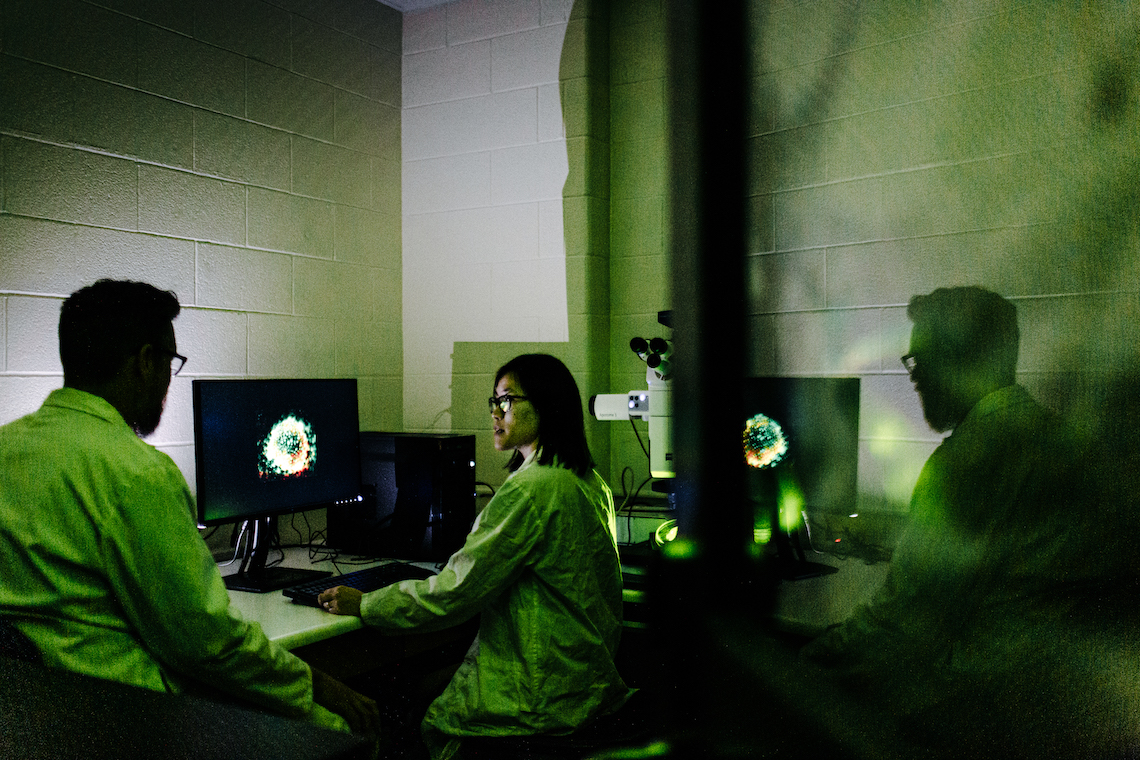Arthur Mortha (left) and Pailin Chiaranunt led new research that unveils new insights into how our resident gut microbes influence immune development. (Photo credit: Mark Bennett)
September 27, 2023
By Betty Zou
Most readers of the now-famous line, “I am large, I contain multitudes,” from American poet Walt Whitman’s work Song of Myself, believe he was referencing the many experiences and dimensions a person and society can have.
Ask a microbiologist or immunologist, on the other hand, and they are likely to share a more literal take on those words. In the nearly 170 years since Whitman wrote his poem, science has uncovered that humans do indeed contain multitudes — of tiny organisms that live in our bodies and affect health.
Now, a new study from University of Toronto researchers is shedding more light on how the community of microbes in our gut contribute to a well-functioning immune system and defend against harmful pathogens.
“The fact that there are these vast ecosystems of bacteria, fungi, viruses and other microbes living inside us really reshaped the way I see the human body,” says Pailin Chiaranunt, a PhD student in the department of immunology at U of T’s Temerty Faculty of Medicine and lead author of the study.
Called the microbiome, this collection of microorganisms that live in and on our bodies plays a critical role in health and disease. Certain microbiome features — for example, whether there is more of one species or less of another — have been linked to a variety of health outcomes, from autoimmune and mood disorders to cancer risk and treatment response.
After learning about the microbiome as an undergraduate student and then falling in love with immunology as a research technician, Chiaranunt became interested in how the microbiome and immune system interact with each other, particularly in the gut. This led her to U of T to pursue a PhD with Arthur Mortha, an associate professor of immunology who studies the crosstalk between the immune system and gut microbiome.
“The gut is probably one of the most dynamic ecosystems in the body because you essentially have the outside environment inside of you,” says Chiaranunt. “There’s a lot of work the immune system must do to maintain a balance between tolerating helpful microbes, food and other outside factors, and being able to mount an effective defense against pathogens like Salmonella that might show up.”
In their study published in Science Immunology, the researchers turned their attention to macrophages, key immune cells whose job is to gobble up cellular debris and foreign microbes and kick start the immune response.
Using mouse models, they first found that the transformation of monocytes, a type of white blood cell, into macrophages in the gut requires both a diverse microbiome and a host factor called CSF2. Then, in a series of elegant experiments, Chiaranunt and her colleagues identified the microbial factor driving macrophage development as ATP, a molecule that is universally used as energy currency across all forms of life.
Their work also uncovered how microbial and host factors work together to support a robust immune environment in the gut: ATP produced by resident bacteria in the gut activates immune cells within a network of small, lymph node-like structures across the intestinal tract. These cells then produce the host factor CSF2 which spurs monocytes in the structures to become response-ready macrophages.
The researchers further showed that the macrophages born from this pathway have high metabolisms and as a result, produce a lot of antimicrobial chemicals called reactive oxygen species. The abundance of these chemicals, in turn, contribute to the immune system’s ability to ward off microbial intruders in the gut.
“That was a really cool finding because it suggests a new way in which microbial metabolism can directly impact immune cell metabolism,” says Chiaranunt, who recently defended her PhD thesis and is preparing to start a postdoctoral fellowship at the University of California San Francisco.
While other studies have also found a link between the microbiome and macrophage development, this paper is one of the first to uncover how gut bacteria triggers white blood cells to become macrophages. The identification of CSF2 as a key contributor to that process also highlights the potential of CSF2-targeting treatments to modulate the immune response in people with autoimmune disorders and inflammatory bowel disease.
“Our results bring us a big step closer to understanding the biochemical language spoken by the microbiota,” says Mortha. “Assembling a comprehensive dictionary for this language will help us to interpret when and why friendly and offensive messages are used by gut microbes to communicate with our immune system.”
In addition to other members of Mortha’s lab, this study also included collaborators Slava Epelman, a clinician scientist in U of T’s department of medicine and at University Health Network, and Thierry Mallevaey, an associate professor of immunology at U of T. Mortha, Epelman and Mallevaey are all members of the Emerging and Pandemic Infections Consortium, a U of T Institutional Strategic Initiative focused on developing innovative responses to infectious threats.


